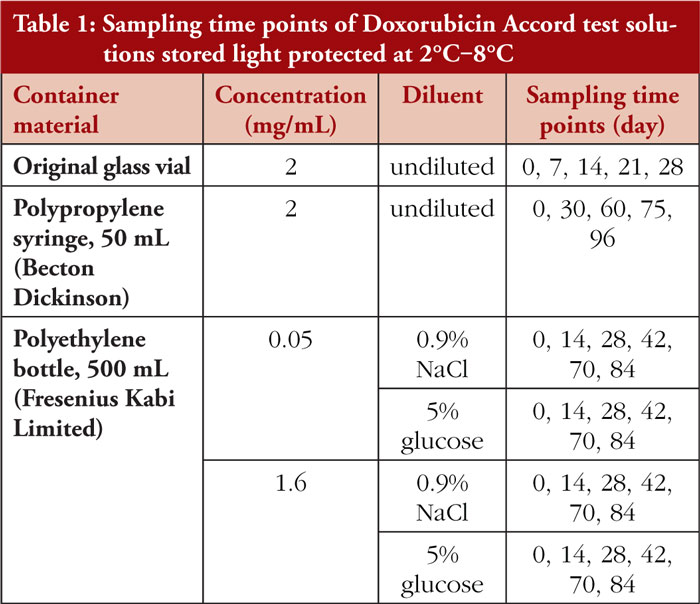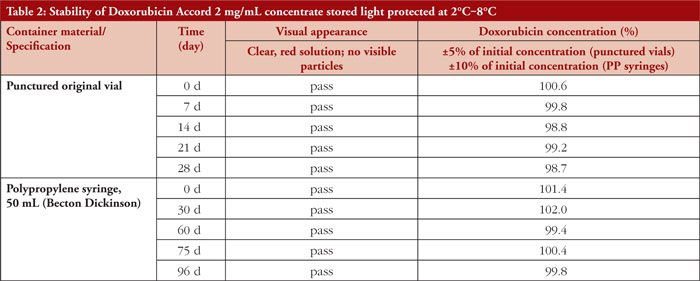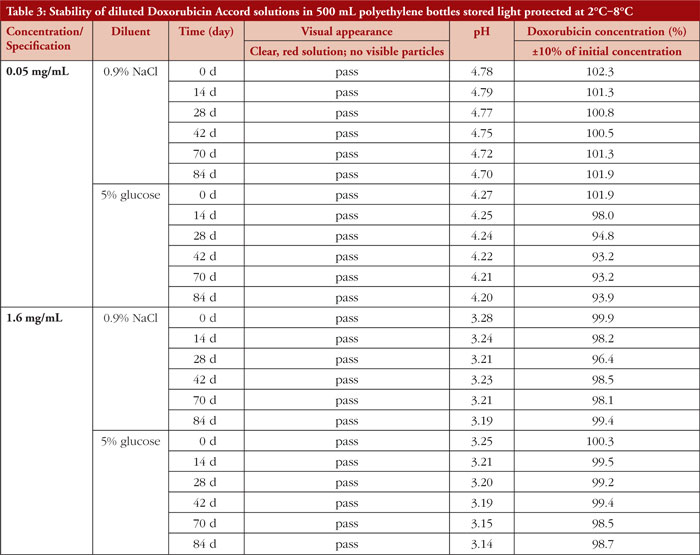Physicochemical stability of Doxorubicin Accord 2 mg/mL in punctured original vials and polypropylene syringes and after dilution with 0.9% sodium chloride or 5% glucose solution in polyethylene bottles
Published on 2024/09/11
Generics and Biosimilars Initiative Journal (GaBI Journal). 2024;13(2):62-4.
Author byline as per print journal: Irene Krämer, PhD; Frank Erdnuess, PhD; Judith Thiesen, PhD
|
Study objectives: To determine the physicochemical stability of Doxorubicin Accord 2 mg/mL concentrate in original glass vials after first opening and after transfer to polypropylene (PP) syringes as well as diluted Doxorubicin Accord solutions (0.05 mg/mL, 1.6 mg/mL) in 0.9% sodium chloride or 5% glucose solution in polyolefine (PO) bottles stored at 2 °C–8°C for up to 96 days. |
Introduction
Doxorubicin is an anthracycline antineoplastic agent that inhibits DNA synthesis by intercalation and interfers with topoisomerase II. It shows a broad spectrum of anticancer activity and is used in combination chemotherapy for treatment of a variety of tumours and haematologic disorders. Doxorubicin consists of the insoluble tetracyclic aglycone doxorubicinone linked to the amino sugar daunosamine. It is unstable in acidic conditions (resulting in hydrolysis of the glycoside bond) as well as in alkaline media (leading to degradation of the aglycone). Physicochemical stability of diluted doxorubicin solutions (ranging from 0.1 mg/mL to 1.4 mg/mL in either 0.9% sodium chloride or 5% glucose as vehicle solution) has been reported in the literature for up to 69 days [1–3]. According to the Summary of Product Characteristics (SmPC), diluted Doxorubicin Accord solutions (with either 0.9% sodium chloride or 5% glucose as the vehicle solution) are physicochemically stable for 28 days at 2°C–8°C and for 7 days at 25°C [4].
Study objectives
To determine the physicochemical stability of Doxorubicin Accord 2 mg/mL concentrate in punctured original glass vials and in 50 mL polypropylene (PP) syringes, as well as after dilution with 0.9% sodium chloride or 5% glucose solution in 500 mL polyethylene (PE) bottles at two doxorubicin concentrations (0.05 mg/mL, 1.6 mg/mL) for up to 96 days.
Methods
Doxorubicin test solutions were aseptically prepared under EU Class A conditions using the European Medicines Agency (EMA) licensed Doxorubicin Accord 2 mg/mL (batch numbers ASDXRP1018 and P05413) as the starting material. Diluted test solutions were obtained by adding the appropriate amount of Doxorubicin Accord 2 mg/mL to 0.9% sodium chloride or 5% glucose solution in 500 mL polyethylene (PE) bottles to achieve doxorubicin 0.05 mg/mL and 1.6 mg/mL solutions. All test solutions were stored at 2°C–8°C protected from light. Samples were taken and analysed initially (Day 0) and at predetermined time points, as shown in Table 1.
Assessment of physical stability comprised visual inspections under standard laboratory light against a black and white background for any changes in colour, clarity, or the presence of particulate matter. pH measurement was conducted with a glass electrode calibrated with standard buffer solutions (diluted solutions only). Chemical stability was assessed via high-performance liquid chromatography (HPLC) assay, which was validated for linearity of analytical response and acceptable precision [5]. The stability-indicating nature of the assay was proven for non-specific degradation of the parent drug. Acceptance criteria were set to ±5% of the initial doxorubicin concentration for Doxorubicin Accord 2 mg/mL concentrate in punctured vials, and to ±10% of the initial doxorubicin concentration for test solutions in PE bottles and PP syringes [5].
Results
Doxorubicin Accord 2 mg/mL concentrate in punctured original vials and in PP syringes remained physicochemically stable when stored refrigerated over the entire observation period of 28 days and 96 days, respectively. Neither colour change, turbidity, nor any particles were detected during visual inspection. The HPLC assays revealed only slight variations of doxorubicin concentrations at different time points which are considered to be related to assay variability, see Table 2.
Diluted doxorubicin 0.05 mg/mL and 1.6 mg/mL solutions in PE bottles remained physicochemically stable when stored light protected at 2°C–8°C over the observation period of 84 days, as shown in Table 3.
Conclusion
If refrigerated storage is available, the remaining Doxorubicin Accord 2 mg/mL in punctured original vials and in PP syringes can be used for up to 28 days and 96 days, respectively. Diluted Doxorubicin Accord infusion solutions, with a concentration range 0.05 mg/mL to 1.6 mg/mL, in PE bottles pre-filled with 0.9% sodium chloride or 5% glucose solution can be prepared in advance and used over a period of 84 days when stored light protected at 2°C–8°C.
Analysis was performed and documented by an accredited external laboratory. Results were carefully checked for plausibility and cautiously interpreted.
Funding sources
This study was funded by Accord Healthcare.
Competing interests: The authors Irene Krämer, Frank Erdnuess, and Judith Thiesen have no competing interests to declare.
Provenance and peer review: Not commissioned; externally peer reviewed.
Authors
Professor Irene Krämer, PhD
Frank Erdnuess, PhD
Judith Thiesen, PhD
Department of Pharmacy, University Medical Center of the Johannes Gutenberg University Mainz, 1 Langenbeckstraß;e, DE-55131 Mainz, Germany
References
1. Wood MJ, Irwin WJ, Scott DK. Stability of doxorubicin, daunorubicin and epirubicin in plastic syringes and minibags. J Clin Pharm Ther. 1990;15(4):279-89.
2. Beijnen JH, Neef C, Meuwissen OJ, Rutten JJ, Rosing H, Underberg WJ. Stability of intravenous admixtures of doxorubicin and vincristine. Am J Hosp Pharm. 1986;43(12):3022-7.
3. Stewart JT, Warren FW, King DT, Venkateshawaran TG, Ponder GW, Fox JL. Stability of ondansetron hydrochloride, doxorubicin hydrochloride, and dacarbazine or vincristine sulfate in elastomeric portable infusion devices and polyvinylchloride bags. Am J Health Syst Pharm. 1997;54(8):915-20.
4. Accord Healthcare Limited. Summary of product characteristics for Doxorubicin Accord 2 mg/mL concentrate for solution for infusion. Available from: https://cdn.accord-healthcare.com/ie/public/spc/spc_doxorubicin_2_mg.ml_concentrate_for_solution_for_infusion.pdf
5. Accord Healthcare Limited. Data for HPLC assay and acceptance criteria on file; 04-02-14.
|
Author for correspondence: Judith Thiesen, PhD, Department of Pharmacy, University Medical Center of the Johannes Gutenberg University Mainz, 1 Langenbeckstraße, DE-55131 Mainz, Germany |
Disclosure of Conflict of Interest Statement is available upon request.
Copyright © 2024 Pro Pharma Communications International
Permission granted to reproduce for personal and non-commercial use only. All other reproduction, copy or reprinting of all or part of any ‘Content’ found on this website is strictly prohibited without the prior consent of the publisher. Contact the publisher to obtain permission before redistributing.





